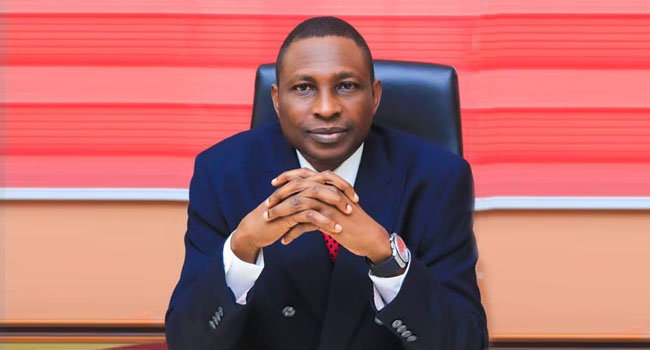The Economic and Financial Crimes Commission (EFCC) has dismissed two staff members over alleged corruption, signalling a renewed commitment to internal accountability.
Ola Olukoyede, the EFCC chairman, made this revelation during the annual criminal law review conference organised by the Rule of Law Development Foundation in Abuja on Tuesday, according to BusinessDay.
Olukoyede emphasised the agency’s dedication to reforming its operations and maintaining integrity among its personnel. “You can’t be fighting corruption with dirty hands,” he said, confirming that the dismissed officials are under investigation for prosecution.
“We are preparing case files for those dismissed. Integrity demands that anyone representing the EFCC must be above reproach,” he said.
Olukoyede also threw down a public challenge, inviting anyone with evidence of him taking bribes to come forward.
The EFCC chairman disclosed a series of reforms aimed at improving the agency’s efficiency and transparency. Among these is a reviewed arrest and detention policy, which minimises the need for overnight detentions during investigations.
“I have investigated an entire ministry—ministers, directors, and all— without detaining anyone overnight, yet obtained all the needed information,” Olukoyede shared.
Further reforms include streamlining prosecutions. Olukoyede stated that the era of filing cases with excessive counts— sometimes as high as 150 charges— is over.
He capped prosecutions at a maximum of 15 charges to ensure focus and diligence.
“No case should fail due to lack of diligent prosecution,” he stressed, adding that he personally vets case files, particularly for high-profile matters.
Olukoyede, who previously served as the commission’s secretary, recounted his two-year experience of being under investigation.
He said this experience has deepened his understanding of the importance of fairness and adherence to the rule of law in the EFCC’s operations.
“My major objective is to stimulate the economy through our work while ensuring integrity and morality guide our actions,” he stated.
Olukoyede welcomed public scrutiny of the EFCC but urged critics to be constructive.
“What do we gain by running down our institutions? If you notice anything wrong, come to us. We will engage you and explain our reforms,” he said.
He also highlighted improvements in the agency’s interrogation rooms, ensuring compliance with court judgments and respecting human rights during investigations.
The conference also touched on a significant legal victory for the EFCC.
He recalled that on November 15, the Supreme Court dismissed a suit by 16 states challenging the constitutionality of the EFCC Act.
“Uwani Abba-Aji (Justice), leading a seven-member panel, ruled that the Act does not require ratification by state houses of assembly,” he said.
Joseph Daudu, coordinator of the Rule of Law Development Foundation, praised the conference as a platform for evaluating the criminal justice system’s effectiveness, from crime detection to adjudication.
Olukoyede’s added that his agency is determined to rebuild public trust in its ability to fight corruption effectively and transparently.



